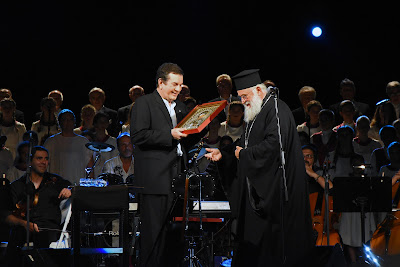Jeff—Saturday
A friend of mine from Switzerland, who’s a big fan of
mysteries and Greece, just sent me an email describing a miraculous experience
he had a month ago on the island of Corfu. Miraculous life saving experiences
aren’t unique to William Griffiths, for aside from having created hand-rub
formulas celebrated by World Health Organization in its “Clean Hands Save
Lives” program, he’s been present at more miraculous, life-saving moments than
I care to say.
Though some wags might be tempted to say to one involved in
so many situations requiring miraculous intervention, “Please send me your
itinerary so I know where not to be,” William sees it as another of his
continuing contributions toward bettering lives.
Among the many ways he betters those lives is by taking
their photographs, for he’s also an excellent photographer.
At times, William’s avocation overlaps with one of his miraculous
moments, as was the case with his latest experience at the concert of his good
friend, Greek classical composer Stamatis Spanoudakis.
Here is my adaptation of William’s brief run down of the
miracle he witnessed on Corfu. It’s of the sort he labels, “Hazards and Coincidences”:
It all happened on the Greek Ionian island of Corfu on the evening of Sunday,
August 7th. The concert was
scheduled to start at nine, but as musicians waited offstage to take their
places, the Bishop of Corfu used the opportunity of welcoming Maestro
Spanoudakis to give the crowd of 3,500 fans a half-hour speech.
[I can just see the audience fidgeting in its seats.]
As soon as the Bishop finished, the musicians hustled on stage, unexpectedly
accompanied by an unwelcome crew of gate-crashers: trees of lightning, roars of
thunder, near gale force winds, and heavy rain…the tail end of a fierce storm
that brought flooding and 20 deaths to FYROM.
Next to the stage stood a fifty-foot high metal pole holding heavy concert
lights in place. The winds sent the pole
crashing to the ground at the spot just vacated by the musicians—and opposite
to where they now stood—while rains drove the 3,500 fans to the exits, and winds
sent their now empty chairs flying in all directions.
Miraculously, only one person was injured, and he just slightly.
As William puts it, the Bishop’s speech averted disaster, for by speaking
as long as he did he’d not left enough time between the musicians coming on
stage and the storm hitting for fans to move into the prime spot vacated by the
musicians. Had he spoken any less—or
more—the falling light pole most certainly would have cost lives.
Way to go, William!
By the way, the concert was held on the following night—before an even
larger crowd—and here’s an example of Spanoudakis’ music.
––Jeff





















Love the music, love the story, love the author. Just all around a lovely way to go off to bed. Not with the author, mind you...
ReplyDeleteI don't know what you did before writing this very kind note, but it also qualifies as a miracle worker.
DeleteGreat music and fabulous story. I always like happy endings where lightning and disaster are concerned...
ReplyDeleteI just like happy endings.
DeleteSpeaking of lightning, wasn't it interesting that lightning struck the Vatican the day the last pope resigned ...?
ReplyDeleteHow appropriate. :-) Then, of course, one must ask how OFTEN the Vatican gets hit by lightning... Found this article that tries to answer the question:
Deletehttp://www.bbc.com/news/magazine-21630874
I just wonder what it was aiming at.
Delete